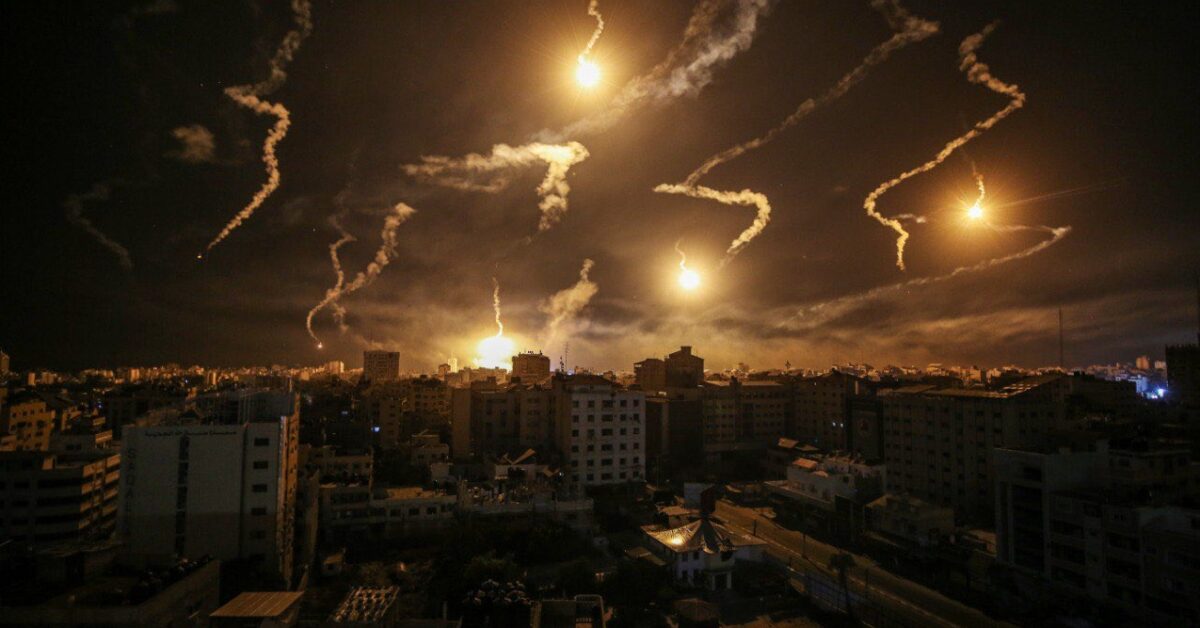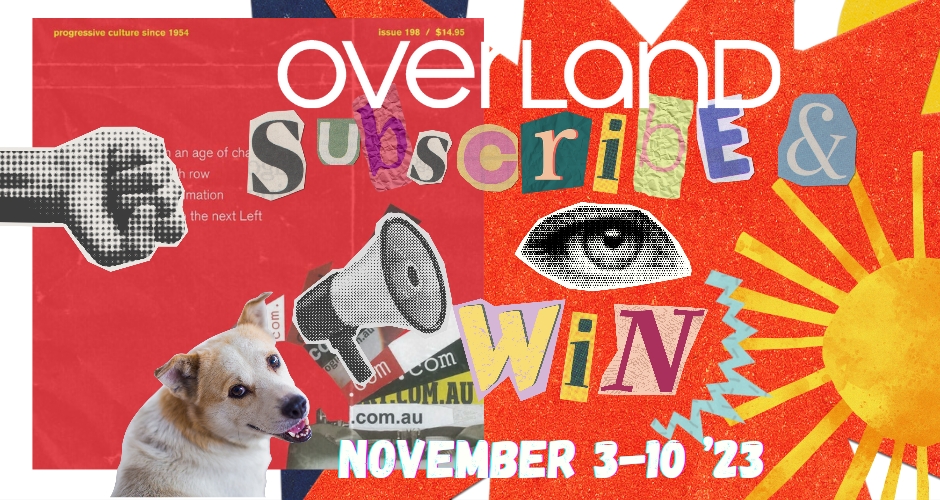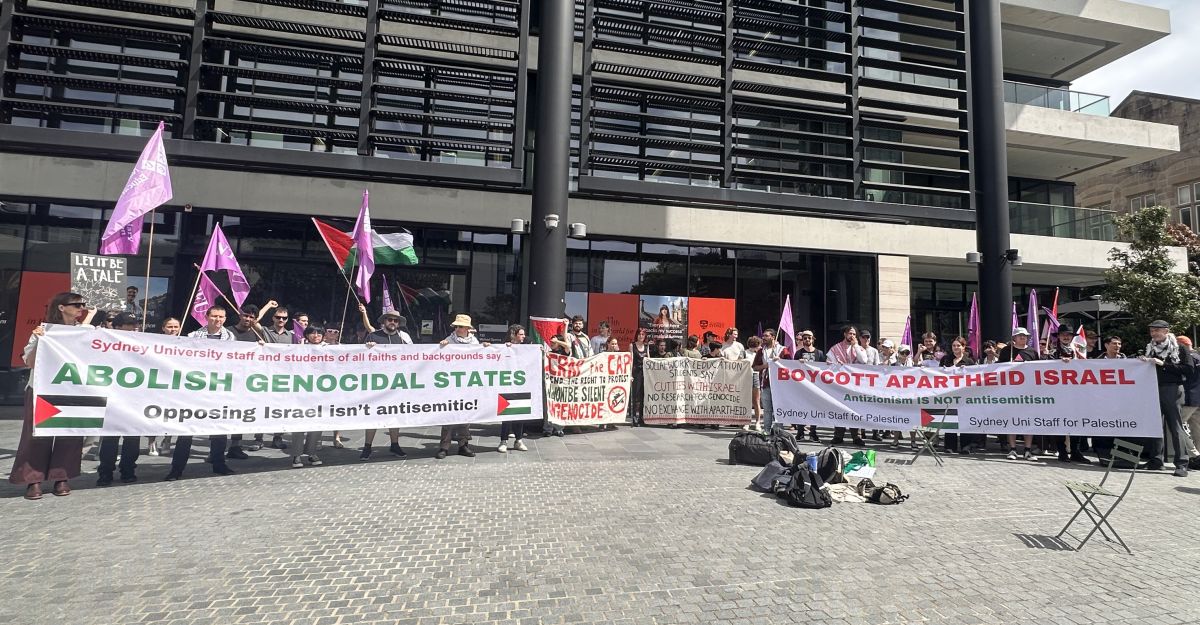Since the attacks committed by Hamas on the seventh of last month, we have received considerable criticism, offered in good faith and otherwise, for publishing a number of collective statements in solidarity with the Palestinian people, and for our staff-members’ presence at marches in protest of Israel’s ongoing war-crimes. Given the sclerotic condition of Australian political discourse, this isn’t surprising. Our predecessors at Overland have had to make the same arguments against the same bad faith actors to defend support for Palestine many times. But I have been shocked by the doggedly misdirective persistence of these arguments as the bombs continued to fall.
To first concede what’s worth conceding: one of the statements we published included a regrettably imprecise ‘if’, which allowed it to read as broadly ironising or conditionalising the moral status of crimes committed against civilians. Neither we nor the authors intended this reading: their stipulation was directed at the luridly propagandistic and wholly unsubstantiated claims which were then being uncritically disseminated regarding the beheading of babies. The statement was amended to clarify their authors’ intention that crimes should be demonstrated and punished as crimes, rather than with indiscriminately asymmetrical violence against a civilian population. This was unfortunate, and it has been corrected in dialogue with the writers of the letter, as well as those who raised this concern with us in good faith.
The same statement was, and less creditably continues to be, criticised for blaming the IDF for the explosion at the Al-Ahli Hospital, as though it were deliberately misrepresenting an otherwise settled matter. I am not a munitions expert, but from the opinions of those who are, the issue remains contested. While the different news sources we follow consider the cause of the explosion ambiguous, however, they are emphatic in their disproof of the dubious videos and recordings presented as evidence of Palestinian culpability by Israeli spokesmen. If their description of this media strategy as one of deliberately deceptive misinformation is correct, then it is congruent with a well-established IDF modus operandi, which has indisputably merited a suspicious hermeneutic over many years. In a wider sense—though this point is academic in the worst sense of the word—despite their vociferous protestations regarding Al-Ahli, Israel had prior to and since bombed several hospitals, refugee camps, and residential buildings with impunity, and rendered many others incapable of medical care by depriving them of power, even to the vicious extent of destroying solar panels.
For the rest, the criticisms we continue to receive multiply, even as the State of Israel denies food, water, and power to two million fucking people, and drops an explosive tonnage exceeding Hiroshima on the most densely populated region on earth, targeting schools, hospitals, universities, bakeries, fishing-boats, water-towers, and refugee camps — including those in which Gazans have been explicitly instructed to seek refuge; even as ever more historians and human-rights lawyers explicitly call Israel’s response the genocide it is; even as the Australian media maintains its cowardly passivised lock-step; even as the powers of the Western world refuse to endorse even the most anodyne limit to Israel’s violence, has merely demonstrated the appalling pervasion of the manufactured consent to Palestinian death. Further, that we continue to be accused of making Jewish people ‘unsafe’ by the mere act of allowing Palestinian voices to be heard at all, while one of the most sophisticated armed forces in the world unleashes horrors of escalating scale on a captive civilian population is, to put it mildly, staggering. It is as though Israel has arrogated all available languages of suffering to itself, and even our fractional dissent from that prerogative, solitary in the Australian media ecology, somehow calls into question the legitimacy of all Jewish pain. Clearly, the Western mind possesses no thinkable limit to Israel’s right to violence.
To address once and for all the asinine and dishonest complaint that we have voided some categorical duty by failing to condemn Hamas while daring to assert the value of any other Middle Eastern life— I, we, Overland, unambiguously consider the civilian murders perpetrated by Hamas atrocities. Of course they are; what else would they be? But they are also obviously contiguous with legion others committed by the IDF in Gaza and the West Bank; and it is dialectically inevitable, not to say obvious, that oppressed people resist their oppression. Sometimes that resistance is non-violent, as 2018-2019’s Great March of the Return in which unarmed civilians were massacred by the IDF overwhelmingly was, and sometimes resistance involves means that are brutal, ugly, atrocious, and yes, if the word does possess some alchemical tonic for those with infantile versions of history, condemnable. The stultifying insistence that any comment on any aspect of this catastrophe unilaterally condemn foremost one part of it precludes accuracy, honesty and integrity. With this puerile rhetorical circumscription of moral responsibility Israel is effectively refusing to allow Hamas to be historicised, and those who yield to this insidious tactic — to paraphrase the judgement of a famous passage from CLR James’ The Black Jacobins (1938) — condemn the violence of the rebel slave but not that of the master.
What, we are called to wonder, in the face of the Western world’s nigh-ubiquitous condemnation of Hamas, and nigh-unconditional support for Israeli retribution, could a further syllable of acrimony echoed by us possibly achieve? Nothing at all, of course, except shore up a paranoiacally brittle Manichaean narrative structured by what Christopher Bollas calls violent innocence, rationalising an utterly unconscionable human inequity. What, moreover, is the calamitous effect of our particular dissent from this universal narrative, small as it is? Of that I am unsure, but like the rest of you over the last month I’ve watched scene after scene of bloodied and brutalised children interspersed with those of winsome IDF soldiers and triumphant Knesset ministers. Even to an indoctrinated mind, the cognitive dissonance must be immense. It’s conceivable that this ritual of mandatory condemnation concentrates and cathects the burden of all past and future violence into a demonic parody of Hamas, registered not as a contingent and conditional object like all other political forces, however ugly — but a transhistorical absolute of evil embodied.
Mythological conceptions of history have their consolations. Here, I suspect that one of them is a kind of desperate catharsis, absolving of the damning obligation to even witness the escalating feats of cruelty being practised in Gaza, and not just for Israelis. What could they, we, I, anyone have done in the face of such condemnable unadulterated, unhistorical, inhuman evil. This tragedy was surely inevitable. But we know, with all schoolchildren, as Auden puts it, that evil has a perfectly human aetiology. We know how it festers in the hearts of the damaged and metastasises in the minds of their children. We know how it rots sympathy and warps principle, and today we clearly know how it monsters language itself such that suffering can no longer be heard in it. This is, among other things, one of the stories of the modern State of Israel. To consent to this mythifying fiction is to commit an infantilising philosophical dishonesty; as though we could not all imagine ourselves wreaking acts of bloody horror if, immiserated, scorned, and humiliated for generations, we suddenly caught the whip-hand, and as though that were not perfectly human. Of course not, because we in the West are truly better, rather than merely luckier.
Prior to the assault on Gaza, some of our critics articulated reasonable, good-faith concerns for the semantic drift of the uniquely abhorrent crime of genocide. At which point the October attacks were directly proximate, and Israel’s reprisals largely speculative, although that speculation had seventy-five years of precedent. Now, however, the fact that educated academics and artists are capable of reiterating that concern in a signed letter devoid of any call to action or even acknowledgement of Israel’s continuing and escalating violence — while the bodies heap high and the IDF flagrantly indulge in a national sadism — is merely eloquent of the bone-deep dehumanisations that led us here.
The brazen statements of the Israeli leadership amply and unambiguously fulfil the dolus specialis aspect of the UN’s bipartite definition: the intent to destroy. Future history books will tally these evasive prevarications next to Yoav Gallant’s remark about ‘human animals’, Netanyahu’s citation of the divine injunction to the utter destruction of Amalek in Samuel, and the remarks of the platformed IDF motivational speaker and Deir Yassin massacre veteran Ezra Yachin: ‘Erase them, their families, mothers and children. These animals can no longer live.’ The intent is indisputable, and as Palestinian civilians begin to die of dehydration and starvation, the act itself indisputably unfolds.
Evelyn encouraged me to end this with a conciliatory gesture towards hope in the surging solidarity evinced by the unprecedented protest-marches we’ve seen in every major city in the country, and all around the world. In the humbling courage and eloquence of the many progressive Jewish activists who refuse to let Israel act in their name, which has truly exemplified the greatest of human moral potential. But in the width between the millions verging on starvation in the ‘children’s graveyard of Gaza,’ and those comfortable of Melbourne with the blasphemous temerity to claim themselves made ‘unsafe’ by a slogan or a poster, I’m less capable of reparative feeling.
Beautiful words written by Palestinian poets like Mahmoud Darwish are circulating like flowers among mourners, but the funeral hasn’t started yet, and behaving as though it were inevitable makes its cruelty inscrutable like that of God, rather than a creature of our own shameful collusions. So I’d rather end with words from the true poet of capitalism’s complicity and despair and abject bad faith, the late Sean Bonney:
In the meantime, let none of us wipe the blood from our faces.
Image: Times of Gaza







